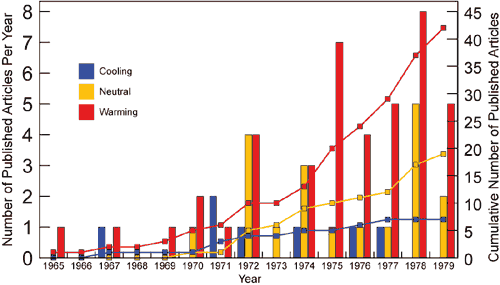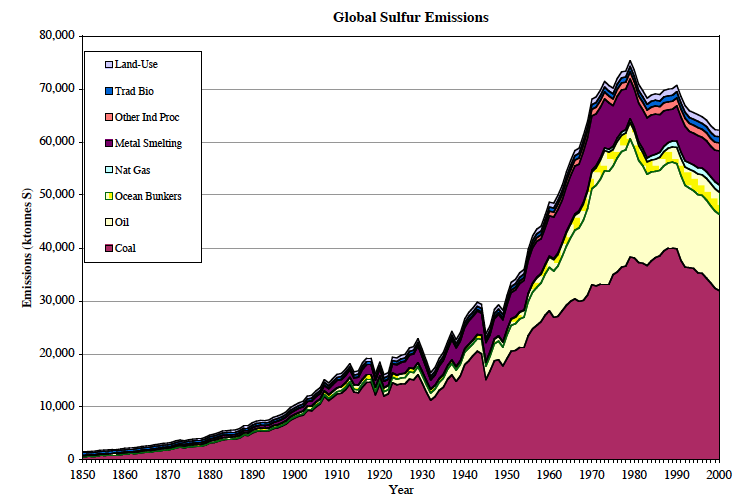Christy Crock #1: 1970s Cooling
 In the recent U.S. House of Representatives Committee on Science Space and Technology climate hearing, Dr. John Christy was the main witness presenting the opinions of the global warming "skeptics." As we previously noted, the quality of Dr. Christy's testimony was extremely disappointing, as he frequently repeated and affirmed climate myths. Perhaps the worst example of this misinforming behavior was his response when asked about the 1970s global cooling predictions, which is currently the 9th most used myth in the Arguments Database. First by Congressman Chip Cravaack (R-MN):
In the recent U.S. House of Representatives Committee on Science Space and Technology climate hearing, Dr. John Christy was the main witness presenting the opinions of the global warming "skeptics." As we previously noted, the quality of Dr. Christy's testimony was extremely disappointing, as he frequently repeated and affirmed climate myths. Perhaps the worst example of this misinforming behavior was his response when asked about the 1970s global cooling predictions, which is currently the 9th most used myth in the Arguments Database. First by Congressman Chip Cravaack (R-MN):
"back when I was graduating from high school I remember the "great global cooling." Is this "great global cooling" similar to the great global warming that is going on today?"
And later repeated by Congressman Mo Brooks (R-AL):
"I couldn't help but pull up the Time magazine front page article dated April 28th, 1975 where we have a penguin on the cover and it says "How to Survive the Coming Ice Age". How do you compare that global cooling claim versus today's global warming claim?"
Dr. Christy's responses to both questions were very similar. Instead of using the opportunity to dispel the myth and ensure that our policymakers are well-informed about the many differences between the '70s cooling predictions and the current global warming predictions, he decided to promote it:
"In this sense yes [1970s cooling predictions were similar to current warming predictions], our ignorance about the climate system is just enormous"
Let's examine the many reasons why the 1970s cooling predictions were different than today's warming predictions, which an honest scientist would have discussed.
Consensus
As Dr. Kerry Emanuel noted after Dr. Christy's second affirmation of this myth, only a few scientific papers in the 1970s predicted global cooling, and were subsequently amplified by the mainstream media, as noted in Congressman Brooks' question. In fact, the majority of climate science studies at the time predicted global warming (Figure 1).

Figure 1: Number of papers classified as predicting global cooling (blue) or warming (red) (Source: Peterson 2008)
Conversely, there is currently a scientific consensus that the planet will continue to warm. Dozens of major scientific bodies throughout the world have affirmed the consensus, while no major scientific bodies predicted global cooling in the 1970s.
Understanding of Climate Science
Although it's certainly true that we don't understand all of the detailed workings of the global climate and still have much to learn, climate scientists have made great strides understanding what drives climate change over the past 40 years.
In the 1970s, there were no climate satellites and no Antarctic ice cores. Climate modeling was in its infancy; today's extremely sophisticated climate models are run on supercomputers. Over the intervening decades there has been an immense amount of climate-related data collected, and many thousands of climate studies published. We have learned a great deal about the various warming and cooling effects on the climate, including greenhouse gases and aerosols.
Dr. Christy's insinuation that we remain nearly as ignorant about the workings of the climate today as the 1970s is simply ludicrous, and an insult to his climate scientist colleagues. He's effectively pushing the logical fallacy that "we don't know everything, therefore we know nothing."
Prediction Scenarios
Quite often, the justification for the few global cooling predictions in the 1970s is overlooked. Probably the most famous such prediction was Rasool and Schneider (1971):
"An increase by only a factor of 4 in global aerosol background concentration may be sufficient to reduce the surface temperature by as much as 3.5°K."
Yes, their global cooling projection was based on a quadrupling of atmospheric aerosol concentration. This wasn't an entirely unrealistic scenario - after all, sulfur dioxide (SO2) emissions were accelerating quite rapidly up until the early 1970s (Figure 2). These emissions caused various environmental problems, and as a result, a number of countries, including the USA, enacted SO2 limits through Clean Air Acts. As a result, not only did atmospheric aerosol concentrations not quadruple, they declined starting in the late 1970s:

Figure 2: Global sulfur dioxide emissions by source (PNNL)
The real similarity is that if we now limit CO2 emissions, we can also eventually get global warming under control.
Christy's Crock
Dr. Christy chose not to mention any of these major differences, or the similarity in the solutions to the problems posed by SO2 and CO2. Instead he chose to pretend that the two examples are similar, leading our Republican policymakers to their desired conclusion: that because there was a supposed consensus predicting global cooling in the 1970s which didn't come to fruition, that there's no reason to believe that today's consensus of continued global warming will come to fruition. This delusion of pretending that an environmental problem we solved was never a problem at all (e.g. ozone depletion, acid rain, etc.) seems to be a common strategy among "skeptics." The reason these cooling predictions didn't come to fruition, aside from the continued acceleration of CO2 emissions, is that we put limits on SO2 emissions to solve the problem. It's not that it was never a concern or it went away on it's own; we did something about it. The same applies to global warming and CO2. It's a problem and it's not going away unless we do something about it.
Christy's intellectual dishonesty while testifying before Congress under oath has misinformed our policymakers. Once again, Christy has done his country a disservice through his Congressional testimony.
NOTE: This post has been incorporated into the Intermediate rebuttal to "Ice Age predicted in the '70s"
Posted by dana1981 on Friday, 8 April, 2011
 In the recent U.S. House of Representatives Committee on Science Space and Technology climate hearing, Dr. John Christy was the main witness presenting the opinions of the global warming "skeptics." As we previously noted, the quality of Dr. Christy's testimony was extremely disappointing, as he frequently repeated and affirmed climate myths. Perhaps the worst example of this misinforming behavior was his response when asked about the 1970s global cooling predictions, which is currently the 9th most used myth in the Arguments Database. First by Congressman Chip Cravaack (R-MN):
In the recent U.S. House of Representatives Committee on Science Space and Technology climate hearing, Dr. John Christy was the main witness presenting the opinions of the global warming "skeptics." As we previously noted, the quality of Dr. Christy's testimony was extremely disappointing, as he frequently repeated and affirmed climate myths. Perhaps the worst example of this misinforming behavior was his response when asked about the 1970s global cooling predictions, which is currently the 9th most used myth in the Arguments Database. First by Congressman Chip Cravaack (R-MN):


